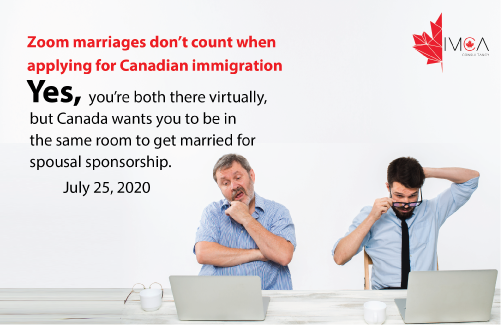Zoom marriages don’t count when applying for Canadian immigration July 25, 2020

Yes, you’re both there virtually, but Canada wants you to be in the same room to get married for spousal sponsorship.
Canada’s immigration department doesn’t recognize virtual marriages for family-class sponsorship, however, foreign spouses might still be able to cross the border.
The rule dates back to 2015. Immigration, Refugees and Citizenship Canada (IRCC) decided that only Canadian Armed Forces members could sponsor their spouse who they married from a distant location, and only if certain conditions forced the marriage to be done virtually or “by proxy.”
This decision, which is causing some cross-border couples headaches today, was an effort to prevent victims of forced marriage from being eligible for immigration. Proxy marriages facilitate this type of abuse, because neither person has to be present for the solemnization. In simple terms, it is easier to force two people to get married if they are not the ones signing the contract.
But when it comes to a legitimate couple who needs to have a video conference wedding because of coronavirus measures, immigration law experts question whether or not it counts as a proxy wedding.
The difference between proxy and virtual weddings is that proxies can be done by a representative, whereas couples participate in virtual ceremonies either through video messenger, phone or even fax.
The law under the Immigration Refugee Protection Regulations specifically states that couples have to be “physically present” at their marriage ceremony in order to be considered for spousal sponsorship.
“To be considered physically present at a marriage ceremony, both parties must have participated in a wedding ceremony in person,” both IRCC and Canadian Border Services Agency (CBSA) wrote to CIC News.
The “in person” distinction seems to be increasingly called for during the pandemic. Demand for virtual marriages spiked in March and has remained steady since. Kevin Smith, the marketing manager of WebWed, says the online marriage service saw a 400 per cent increase in sales since the lockdown.
“We are doing approximately 20 weddings every day and we used to do about 20 weddings a month,” Smith told CIC News.
The immigration department has put forth a number of measures to keep families together during the pandemic. Most recently, IRCC has made exemptions for immediate family, including spouses, to come to Canada if they are staying for more than 15 days. However, IRCC says that no special measures are in place to accommodate proxy marriages.
That doesn’t mean married couples who tied the knot over video messenger have no options. Married couples can still be assessed as common-law partners if they meet all the requirements and have lived together for at least 12 consecutive months. They may also be able to get married for IRCC’s purposes in Canada if they are allowed to cross the border.

